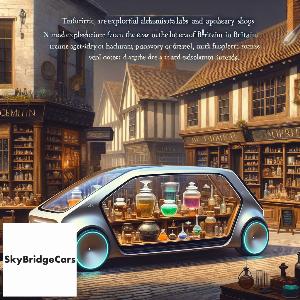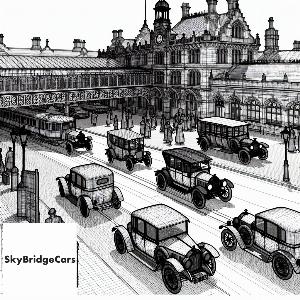Exploring Britains Historic Clockmaking Workshops and Horology Museums by Minicab

Historic Clockmaking Workshops in Britain
Britain's rich history in clockmaking is a fascinating journey that can be explored through its numerous historic workshops and horology museums. These establishments, scattered across the country, offer a unique insight into the evolution of timekeeping devices and the craftsmanship involved in their creation. One of the most renowned workshops is the Dent Clocks in London, known for crafting the iconic Big Ben's clock. Another notable mention is the Smith of Derby, a family-run business that has been making clocks since the 1850s. Horology museums like the British Horological Institute Museum in Newark and the Clockmakers' Museum in London house an impressive collection of timepieces, from sundials to atomic clocks. Exploring these workshops and museums by transfer is a convenient and comfortable way to delve into Britain's clockmaking history. It allows for a personalised itinerary, the luxury of time, and the ease of travel. This journey through time is a must for history buffs and horology enthusiasts alike.
Horology Museums in Britain
Britain is a treasure trove of horology museums and historic clockmaking workshops, offering a fascinating journey into the world of timekeeping. The British Museum in London houses an impressive collection of timepieces, including sundials, water clocks, and mechanical clocks from various periods. The Museum of the History of Science in Oxford showcases a unique collection of early scientific instruments, including a significant horological collection. The Science Museum, also in London, features a Clockmakers' Museum, dedicated to the history of British clockmaking. For a more hands-on experience, visit the workshops of Smith of Derby, a historic clockmaker that has been crafting timepieces since 1856. Traveling by transfer allows for a convenient and comfortable exploration of these horological sites. Whether you're a horology enthusiast or simply curious about the history of timekeeping, Britain's horology museums and clockmaking workshops offer a captivating journey through time.
transfer Services in Britain
Exploring Britain's rich horological history is a unique experience, made even more convenient by the country's reliable transfer services. Britain is home to numerous historic clockmaking workshops and horology museums, each offering a glimpse into the intricate world of timekeeping. transfer services in Britain provide an efficient and comfortable means of transportation to these fascinating destinations. Whether you're visiting the British Museum in London, home to an extensive collection of timepieces, or venturing to the Clockmakers' Museum, transfer services ensure a seamless journey. They offer the flexibility to plan your itinerary as per your convenience, allowing you to spend as much time as you wish at each location. Moreover, transfer drivers, often locals themselves, can provide valuable insights and recommendations, enhancing your exploration. So, hop into a British transfer and embark on a journey through time, exploring the country's horological treasures.
Famous British Clockmakers
Britain's rich horological history is a testament to its world-renowned clockmakers. A transfer tour of the country's historic clockmaking workshops and horology museums offers a fascinating insight into this timeless craft. Start with the eminent John Harrison, whose marine chronometers revolutionised sea travel. His work is displayed at the Royal Observatory in Greenwich. Next, visit the British Horological Institute in Upton, home to the works of Thomas Tompion, the 'Father of English Clockmaking'. A trip to London's Science Museum reveals the intricate craftsmanship of George Graham and Thomas Mudge. In Derbyshire, the Joseph Knibb clocks at the Derby Museum and Art Gallery are a must-see. Finally, the Clockmakers' Museum in London houses a comprehensive collection of British clocks, watches and sundials. This transfer tour is a journey through time, celebrating the ingenuity and artistry of Britain's most famous clockmakers.
British Clockmaking Techniques
Exploring Britain's historic clockmaking workshops and horology museums by transfer is a unique way to delve into the rich heritage of British clockmaking techniques. The journey begins in London, home to the British Horological Institute, where visitors can marvel at the intricate craftsmanship of timepieces dating back centuries. A transfer ride away is the Clockmakers' Museum, showcasing the evolution of British clockmaking through its extensive collection. Venturing further, one can visit the workshops in Birmingham and Coventry, where traditional clockmaking techniques are still practiced. Here, visitors can witness firsthand the meticulous process of creating timepieces, from the initial design to the final assembly. The journey concludes in the quaint town of Upton, home to the Museum of Timekeeping, housing a vast collection of clocks, watches, and horological tools. This transfer tour offers an immersive experience into the world of British horology, providing a fascinating insight into the country's historic clockmaking industry.
Historic Clocks of Britain
Embark on a fascinating journey through time by exploring Britain's historic clockmaking workshops and horology museums by transfer. Britain, a country steeped in history, has been home to some of the world's most renowned clockmakers. The nation's horological heritage is beautifully preserved in various museums and workshops scattered across the country. From the iconic Big Ben in London to the Salisbury Cathedral Clock, the oldest working clock in the world, Britain's historic clocks are a testament to the country's rich history and craftsmanship. A transfer tour allows you to explore these horological wonders at your own pace. Visit the British Horological Institute in Newark, or the Clockmakers' Museum in London, where you can marvel at the intricate workings of timepieces from centuries past. Whether you're a horology enthusiast or a history buff, a tour of Britain's historic clocks is a journey not to be missed.
Horology Education in Britain
Horology, the art and science of measuring time, has a rich history in Britain. The country is home to numerous historic clockmaking workshops and horology museums, which can be conveniently explored by transfer. These institutions offer a unique insight into the evolution of timekeeping devices, from sundials and water clocks to the precision timepieces of today. Many of these workshops and museums offer educational programs, where visitors can learn about the intricate craftsmanship involved in clockmaking. The British Horological Institute, for instance, provides courses and qualifications in horology. Similarly, the Museum of the History of Science in Oxford houses a vast collection of timekeeping instruments and offers educational resources. A transfer tour of these horological sites not only provides a fascinating journey through Britain's horological history but also offers an opportunity for immersive education in this timeless craft. Whether you're a horology enthusiast or simply curious, exploring Britain's horological heritage is a journey worth taking.
British Horology Events
British horology events offer a unique opportunity to delve into the rich history of clockmaking in the UK. These events, often held in historic clockmaking workshops and horology museums, provide a fascinating insight into the craftsmanship and precision that goes into creating timepieces. One of the best ways to explore these events is by transfer. This allows you to travel at your own pace, stopping off at various locations along the way. You can visit the British Horological Institute in Upton, which houses a museum dedicated to the history of timekeeping. Or, take a trip to the Clockmakers' Museum in London, the oldest collection of clocks and watches in the world. Other notable stops include the Museum of Timekeeping in Newark and the Royal Observatory in Greenwich. Each location offers a unique perspective on the history and art of clockmaking. So, book a transfer and embark on a journey through time, exploring Britain's historic horology events.
Collecting British Clocks
Collecting British clocks is not just a hobby, it's a journey through time, exploring Britain's rich history of clockmaking. This journey can be made even more exciting by visiting historic clockmaking workshops and horology museums via transfer. These places are treasure troves of antique timepieces, each with its own unique story. The British Museum in London, for instance, houses a vast collection of clocks dating back to the 14th century. Similarly, the Museum of the History of Science in Oxford showcases a variety of timekeeping devices from sundials to atomic clocks. A transfer ride to the Clockmakers' Museum, also in London, offers an insight into the lives of British clockmakers over the centuries. Here, you can see the evolution of British horology, from the earliest domestic clocks to modern precision timekeeping. Collecting British clocks is more than just acquiring objects; it's about understanding and appreciating the craftsmanship, innovation, and history that these timepieces represent.
Restoration of Historic British Clocks
Exploring Britain's historic clockmaking workshops and horology museums by transfer is a unique journey into the heart of British heritage. The restoration of historic British clocks is a fascinating process that combines artistry, craftsmanship, and history. These timepieces, often centuries old, are meticulously restored to their original glory by skilled horologists. The British Museum in London houses a vast collection of these restored clocks, offering a glimpse into the evolution of timekeeping. Similarly, the Clockmakers' Museum showcases the rich history of British clockmaking, with exhibits dating back to the 1600s. A transfer tour to these museums provides an intimate look at the intricate workings of these timepieces. The journey also includes visits to active restoration workshops where visitors can witness the delicate process of bringing these historic clocks back to life. This unique exploration offers a deep appreciation of the timeless art of British clockmaking and restoration.
Our Latest Blog Posts

Discovering Britain S Historic Alchemist Labs And Apothecary Shops By Taxi
Information about Discovering Britain S Historic Alchemist Labs And Apothecary Shops By Taxi
Read More
From London Airports: Minicab Rides to Britains Renowned Classical Art Galleries
Blog about From London Airports: transfer Rides to Britains Renowned Classical Art Galleries
Read More
A Minicab Trip to Britains Most Famous Royal Ceremonial Sites
Blog about A transfer Trip to Britains Most Famous Royal Ceremonial Sites
Read More
Discovering Britain S Historic Railway Stations And Transport Hubs By Taxi
Information about Discovering Britain S Historic Railway Stations And Transport Hubs By Taxi
Read More